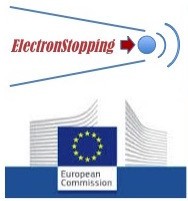ElectronStopping - Electronic stopping power from first principles

Ions traveling through matter at enough speed give rise to non-adiabatic processes by which the electrons of the system become excited. The quantitative understanding of these processes and the ability to reproduce them accurately on the computer is of direct relevance to, among others, the nuclear and space industries and to cancer radiotherapy with ions.
In spite of this importance, ab initio calculations of the electronic stopping power in materials represent a research field still to flourish. We have recently demonstrated the possibility of accurate calculation and analysis of such processes in two paradigmatic cases (light projectiles in LiF and in Au). The Electronstopping project proposes to establish the method with flexibility and generality, so that it can be applied to a large variety of systems by agents in the mentioned fields, while we explore the behavior of the electronic-excitation processes in a set of varied materials and situations.
We will start by simulating the electronic stopping of H and He in aluminum, to address recent interesting and unexplained experimental observations. We will then proceed to a systematic comparison of electronic stopping among insulating solids of different chemistries, studying the behavior of the threshold effect in the electronic stopping power when changing band gap and bond type. We will then explore the dependence of the electronic stopping power on impact parameter when in channeling conditions, allowing for trajectories to deviate from the channel direction along the way. Finally, we will study the electronic stopping power in liquid water, and in a guanine-cytosine nucleoside pair in water.
CIC nanoGUNE - Spain
